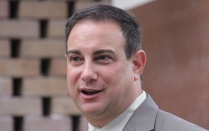Law Links - October 2016
An exoneree’s story moves School of Law audience

Gary J. Muldoon '76, Marty Tankleff, and Jon P. Getz '92
Six Thousand Three Hundred and Thirty Eight Days. That’s how long Marty Tankleff spent in prison after he was convicted as a teenager in 1990 of killing his parents in their Long Island home.
And then he went free – a triumph of a legal system that, as he says, “couldn’t incarcerate an innocent person forever. I still had faith that the system eventually had to work.”
Tankleff told his emotional story of a gross miscarriage of justice, and its eventual correction, to a rapt audience Oct. 6 at the School of Law. About 50 people – including members of a Conviction and Remedies course taught by adjunct professors Gary J. Muldoon and Jon P. Getz, part of the school’s Advocacy Institute – were in attendance.
In part Tankleff’s appearance was to inspire the work of the institute’s Innocence and Justice Project, in which students press the appeals of inmates who assert they were wrongly convicted or were denied due process.
His story provided that inspiration in spades. Tankleff just turned 17 when his parents were killed; he was taken to police headquarters and interrogated relentlessly until law enforcement claimed he made a confession – one that was not captured by any means, whether by audio, video or even stenographic, even though Suffolk County had the technology and a policy and procedure.
He was convicted of two counts of murder even though a plausible suspect had emerged: a shady business partner of his father’s, who had changed his life insurance policy, faked his own death, disguised himself and moved to California where he was found hiding in a psychiatric retreat under one of his five alias. Tankleff was sentenced to 50 years to life.
After a series of federal and state court rulings went against him, Tankleff was able to hire a private investigator – who uncovered, many years after the crime, the getaway driver in the murders. The prime suspect’s son also testified, in a hearing, that his father admitted involvement in the crime.
Finally, in 2007, the New York State Appellate Division heard Tankleff’s appeal, and two days after Christmas that year, he walked out of the Suffolk County Correctional Facility a free man after he was released on bail.
Three weeks later he enrolled in Hofstra University, and after graduation earned a law degree from Touro College. He is currently vice president of Absolutely Innocent, an innocence project in the New York City area. He is also a member of New York City’s Innocence Project Exoneree Advisory Board and also a member of New York’s CURE Advisory Committee.
The work of such projects, he said, is sorely needed. According to the National Registry of Exonerations, 153 people were exonerated last year in the United States. “We as a society get doubly victimized in those situations,” he said. “We incarcerate an innocent person, and we let a guilty person or persons go free to commit additional crimes.”
But, he said, “we don’t have enough resources or enough lawyers doing this litigation.” He urged the audience to support such projects financially; to do this work themselves; and to hold district attorneys accountable for making sure that wrongful convictions do not stand.
“When people think about doing this work,” he said, “they should know that it is fulfilling, it is rewarding, it is challenging and it is difficult. But you’re giving somebody back their life. It’s almost like a rebirth.”
